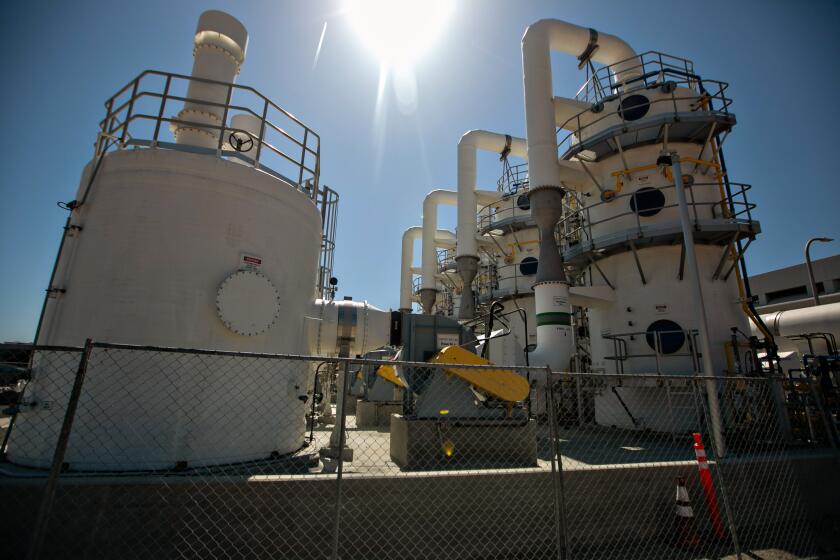Many players on the field
STEPHANIE YELLIN-MEDNICK got through last year without the tingling in her hands that causes her to drop things or the weakness in her legs that knocks her off balance. Then the Food and Drug Administration pulled the drug that was helping her -- Tysabri -- off the market because of rare cases of brain infection in a few people taking it. “It was like a rug pulled out from underneath me,” says the 49-year old Los Angeles Unified school nurse.
While the FDA and Tysabri’s makers, Biogen Idec and Elan Corp., work out the details that will allow physicians to once again prescribe the much-hailed medicine, the outcry of people with multiple sclerosis highlights the need for better therapies to manage -- or cure -- the disease.
To devise more effective treatments, researchers are trying to better understand what goes wrong in the body of a person who has MS -- and the strategy appears to be helping. “There’s a whole pipeline of drugs coming down,” says Dr. Elliot Frohman, a neurologist at the University of Texas Southwestern Medical Center at Dallas.
The approaches include impairing a patient’s immune system and trying to repair damaged nerves.
Researchers think MS, like rheumatoid arthritis and lupus, is an autoimmune disease in which elements of the immune system attack the body. “Autoimmune diseases have been tough to crack,” says medical scientist Dr. David Hafler of Brigham and Women’s Hospital in Boston.
In the case of MS, misbehaving immune cells known as T-cells attack myelin, the protective sheath around nerves. With a pockmarked or missing sheath, nerve impulses don’t travel as well, impairing muscle coordination and mental function.
The T-cells also trigger inflammation and the buildup of plaques near the sheath, which impinge on nerves and ravage cells that make myelin. These plaques can eventually damage the raw nerves, Frohman says.
Frohman says the most promising therapies are drugs such as Tysabri, which prevents T-cells from getting into brain tissue. Dr. John Richert, a neurologist with the National Multiple Sclerosis Society, says the next MS drug likely to make it to market is related to Tysabri: an oral drug called FTY720, manufactured by Novartis Pharmaceuticals. Currently in clinical trials, this compound partially prevents T-cells from leaving the body’s lymph nodes, where they normally reside.
Another area of MS research that might lead to new treatments is neuronal repair and regrowth. Researchers have noted that cells near some inflammatory plaques occasionally repair the myelin sheath. Two years ago, scientists reported finding a gene that is needed for repair to take place in mice with an MS-like condition: The gene is normally inactive in adults, but the finding raises the hope that a drug could be created to turn the gene on or mimic its actions.
Scientists also hope to find a way to build new myelin in people with MS. Myelin is formed from nerve cells called oligodendrocytes, but in adults this formation no longer occurs. Attempts are underway in lab tests to release the cells from this block and let them mature.
Researchers are also exploiting a common hormone that appears to alleviate symptoms. Doctors have long observed that women with MS who get pregnant experience an 80% drop in relapse rates. “That’s better than any drug we have,” says Dr. Rhonda Voskuhl, a UCLA neurologist. Her work suggests the reason for the protection could be a form of estrogen.
During pregnancy, the placenta produces a type of estrogen called estriol (which is somewhat different from estradiol, the main estrogen produced by women’s bodies).
To test whether the hormone might affect the disease, Voskuhl gave estriol to hundreds of mice that have a condition akin to MS. “The mice were less paralyzed. They were walking around instead of laying over,” she says.
In a pilot human trial, Voskuhl gave estriol to 10 women with MS -- and saw an 80% drop in inflammatory flare-ups in the brain, a hallmark of the disease. She also saw an improvement in the patients’ mental faculties, which is unheard of with the anti-inflammatory therapies MS patients generally get.
She plans to start a larger clinical trial in the fall, in which women will be given estriol or a placebo and tracked to determine whether they have fewer brain lesions and relapses, and less trouble thinking.
Voskuhl has similar findings with men and testosterone. Over the course of a year, men with MS taking testosterone improved their cognition by 4%. Normally, men with MS experience a cognitive decline of about 5% to 10% per year.
Even with the MS drug development pipeline, many people with the disease are eager for Tysabri’s return. School nurse Yellin-Mednick says that for her, the risks with Tysabri were no worse than breathing L.A. air or driving in a car. “I would like to take it again,” she says.
*
(BEGIN TEXT OF INFOBOX)
Lipitor to be tested against MS
People with high cholesterol rely on statins to lower cholesterol levels and elude heart attacks. But the drugs might help people with multiple sclerosis too -- at about the same dose that controls cholesterol.
In 1995, researchers noticed heart transplant recipients lived longer if given statins, irrespective of their cholesterol levels. Researchers suspected, and later proved, that statins decreased inflammation.
In 2002, neurologist Dr. Scott Zamvil of UC San Francisco gave atorvastatin (Lipitor) to about 100 mice with an MS-like condition. The drug alleviated symptoms and kept the mice from getting worse.
In an upcoming trial of 152 patients at 14 medical centers, people in the early stages of MS will be given Lipitor and tracked to determine whether the drug can slow or even halt the disease.
-- Mary Beckman



